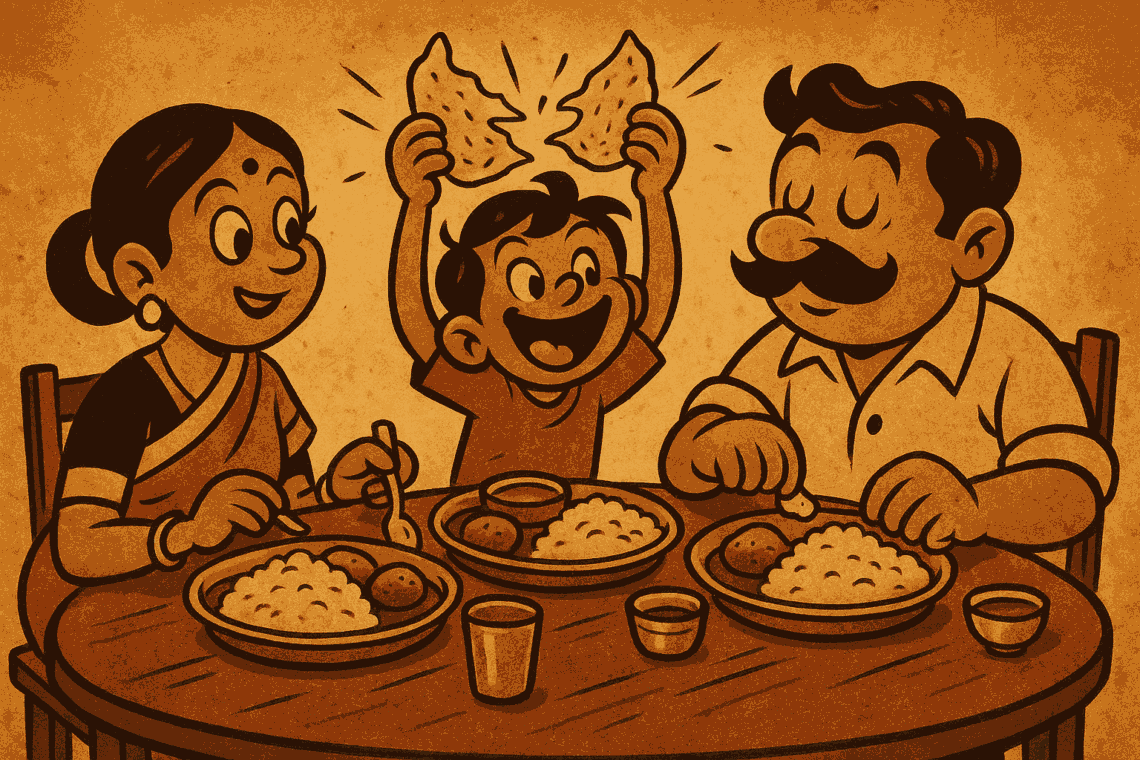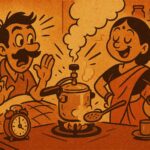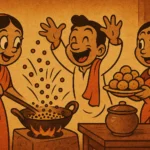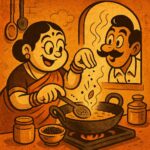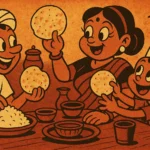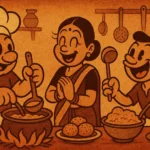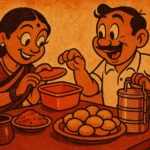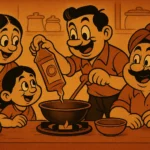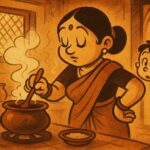In my childhood home in Mumbai, we didn’t need anyone to yell “lunch is ready.” The kitchen told you. You just had to listen.
There was a rhythm to it—a kind of domestic percussion score that played out around 1:15 PM on weekends. First came the hiss of the pressure cooker releasing its second or third whistle, followed by the low metallic clang of the lid being pried off and thudded onto the countertop. Then, the unmistakable ripple and pop of mustard seeds hitting hot oil. Somewhere in between, the muffled scrape of a ladle against steel as sabzi got stirred with what I now understand was impatience disguised as care.
But the grand finale—the sound that truly announced “plate lagao, khana tayyar hai”—was the sharp, staccato crack of a papad being roasted directly over the flame. My mother had a whole choreography for this: hold it just above the blue flame with a pair of tongs, rotate every few seconds, watch for the first brown blister to bloom, then—crack—flip it. That crack was unmistakable. And it meant only one thing: it’s time to eat.
The Sounds of a Meal
In most food stories, we focus on taste. Smell gets some credit. Texture gets a cameo. But sound? That’s the underappreciated character in the story of Indian cooking. And yet, some of my most vivid food memories aren’t of how things tasted, but how they sounded before they even reached my plate.
The gurgle of dal bubbling too close to the lid. The crisp chrrrrrk of a dosa being lifted from a hot iron tawa. The slap-slap of dough being rolled out and flattened into phulkas. The hollow thump of a pressure cooker base on a granite counter. These were signals. Not just sensory clues, but cultural shorthand. If smell was the teaser trailer, sound was the opening scene.
When Papad Speaks
Papad, that thin, fragile disc made of lentil flour and peppery attitude, might be the most underrated sound effect in Indian cuisine. You can fry it or roast it or microwave it (though let’s not talk about that last one), but it has to crack. If your papad doesn’t make a clean, dry snap when you break it in half, something’s gone wrong. There’s science to it—moisture content, roasting temperature—but there’s also pride. A soggy papad is a failed papad. And you’d better believe someone at the table will let you know.
There’s also a peculiar joy in breaking one. You hold it lightly at both ends and bend it till it gives in the middle. That moment of resistance, followed by the audible tchak, feels both satisfying and ceremonial. Like lighting a match or snapping your fingers in agreement. It’s a gesture that belongs to family lunches, to thalis served on banana leaves, to the unspoken rule that no meal is complete until your fingers are dusted with roasted crumbs.
The Kitchen as Soundtrack
These days, living in Austin, my kitchen is quieter. The sounds are different. The extractor fan has a gentle hum. My Instant Pot lets out a polite beep. Even my papads, when I make them, crack a little shyly on the electric burner. It’s not worse. Just quieter. Less theatre, more podcast energy.
But every now and then, when I’m roasting jeera or frying mustard seeds in ghee, I hear something—a brief spit of oil, the sputter of curry leaves—and I’m transported. Back to a two-bedroom flat where the walls were thin but the food was bold. Where the ceiling fan made a steady whirr while rice steamed in the background. Where someone always, always slammed a door right before lunch. Not in anger, but as punctuation. Like: there, meal’s ready. Now come sit.
Sound as Emotion
I didn’t realize how much emotion could be packed into a sound until I moved away. The clank of steel plates, the sizzle of tadka, the pop of a sealed tiffin box opening—these are all deeply coded in my brain as safety, home, and hunger in perfect sync. I miss those sounds. Not in a dramatic way. Just in the way you miss a friend you haven’t called in a while but think of often.
Food, at its best, engages all the senses. But when it’s tied to memory, sound becomes more than sensory—it becomes emotional. It’s the knock at the door when you didn’t know you were waiting for someone. It’s the chorus of comfort before the first bite hits your tongue.
What My Son Will Remember
My son, born and raised in Texas, may not get the same soundscape. His lunch is often a mix of tortillas and leftover rajma. But he’s starting to pick up on cues. He hears the pop of cumin and says, “You’re making dal again?” He hears the rattle of a lid and knows I’ll ask him to set the table soon. Maybe, years from now, when he hears oil sizzling or a pan being scraped, he’ll think of me, of home, of this version of our kitchen that sounds a little different, but loves just as hard.
And maybe he’ll roast papad on an open flame one day and pause, just for a second, to enjoy the sound.
Born in Mumbai, now stir-frying feelings in Texas. Writes about food, memory, and the messy magic in between — mostly to stay hungry, sometimes just to stay sane.

